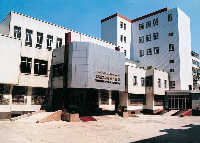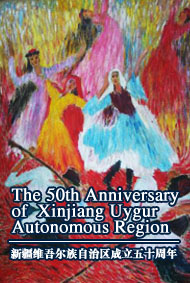|
Research, Excavation, Documentation and Protection of Cultural Relics
( 2005-09-13 )
The Institute, as part of its active program of academic research, has made detailed investigations of the eight grotto groups in the Qiuci area, cataloged the findings and published reports. It has edited and released more than a dozen pictorial albums, article collections and book series, such as the Record of Kizil Grottos, Qiuci Grottos, the Book Series on the Art of Kizil Murals, and the Collection of Articles on Buddhism in Qiuci. It has also published over 100 theses in both domestic and international journals, and successfully hosted three international seminars. It is clear that Xinjiang Qiuci Grottos Institute is now a center for the protection and research of the grottos of Xinjiang.
 Xinjiang Research Institute of Archeology and Cultural Relics Xinjiang Research Institute of Archeology and Cultural Relics
 Established in 1986, the Xinjiang Research Institute of Archeology and Cultural Relics is devoted to the investigation, excavation and archeological research of Xinjiang's cultural relics. Established in 1986, the Xinjiang Research Institute of Archeology and Cultural Relics is devoted to the investigation, excavation and archeological research of Xinjiang's cultural relics.
Following the national heritage policies concerning the protection, rescue, use and administration of cultural relics, the institute has successfully carried out many major archeological investigations and excavations, some in conjunction with key national construction projects. The results have been very encouraging.
The institute has organized surveys on over 4,000 sites, excavated some 100 ancient tombs and archeological remains, including such major discoveries as: Paleolithic sites to the west of the valley in the Ancient City of Jiaohe, Turpan; ancient tombs in the Peacock River of Luobupo desert; tombs at Tianshanbeilu and Wubao in Hami; tombs at the north and west of the valley in the Ancient City of Jiaohe of Turpan; the valley of tombs in Alagou of the Tianshan Mountains; copper mine remains of Nilekenulasai; Jingchawuhu tombs; Luopu Shanpula tombs; Yuli Yingpan tombs; Loulan Remains; Niya Remains; and Yuansha City remains. Among these discoveries, the Niya Remains and Yingpan tombs are listed among the 10 major archeological finds of the country.
The institute has also been successful in fostering international cooperation in archeological research and practices; including the joint investigation and excavation of the Niya Remains (China-Japan) and the Keliya River Regions (China-France).
|

